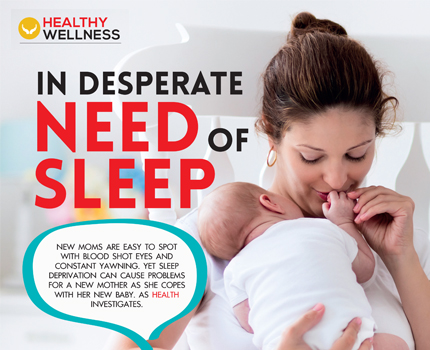 New moms are easy to spot with blood shot eyes and constant yawning. Yet sleep deprivation can cause problems for a new mother as she copes with her new baby. As HEALTH investigates.
New moms are easy to spot with blood shot eyes and constant yawning. Yet sleep deprivation can cause problems for a new mother as she copes with her new baby. As HEALTH investigates.
ASSOCIATED PROBLEMS
Adjusting to the new role of ‘mom’ is hard enough, but what happens when it is coupled with the stress of sleep deprivation? “Scientists tell us that a lack of sleep for 24-hours or more can make us short-tempered and irrational. It can decrease our decision-making capabilities and become one of the most challenging components in the parenting process,” says Sandra Sergeant, R.N, Executive Director of the Infant Care Program, a division of Caring Solutions. The fact is that some new moms feel intense pressure to meet their baby’s every need, maintain a spotless house, and cook three meals a day — all while dealing with postpartum physical discomfort and hormonerelated mood changes. The main problem is that
unfortunately many new moms feel like they can do it all while the baby is sleeping.
THE LOSS
According to Dr. William C. Dement, a physician and sleep specialist, parents of newborns often lose about two hours of sleep per night until the baby is five months old as newborns tend to sleep 16 to 20 hours over a 24-hour period in divided
intervals of two to three hours at a stretch. From this age until their child hits age two, parents usually lose an hour of sleep each night. Of course, if your baby’s awake, so are you, which means that you are on call throughout the night to feed and comfort him/her. This type of sleep deprivation, typical of parents of newborns — where over the course of eight hours you are up two or three times for 20 minutes (or longer) — feels even more grueling than getting just five hours of straight sleep.
EXHAUSTING
The number of awakenings matter more than total hours because sleep fragmentation causes a significant decrease in your deep sleep. Each time you get up and then go back to bed, you have to start the sleep cycle all over again, entering the light stages before you return to deep sleep. The end result is exhaustion.
NAPPING
During your new mom days, napping is a great way to reduce your sleep debt. If you’ve gone awhile without getting good-quality rest, the sleep you do get – even during a nap – will become more effective. With the new baby and your sleep deprived days and nights filled with feeding, burping, and changing will most likely make you fall asleep more quickly. You will also sleep more soundly and therefore you actually get more sleep and refreshment for the shorter amount of time spent in bed.
In fact, researchers found that a 45-minute nap improved alertness for six hours after the nap. For the new mom, making the most of a nap depends on how you slept in pregnancy. Some people sleep for 15 minutes and are refreshed. It all depends on how you gear yourself up to do it, according to your individual circumstances.
SLEEP ACCORDING TO A SCHEDULE
In his book ‘The Promise of Sleep’, Dement explains that newborns’ biological clocks are immature and need time to develop; therefore, it is not a good idea to force them into a regular pattern of sleeping and wakefulness. However, he also
believes that the same sleep cues that work for adults should work for infants as they mature. Cues such as letting light in the baby’s room in the morning, dimming lights in the evening, and maintaining a regular feeding and activity schedule
should help coordinate the baby’s biological clock with the 24-hour day, as he/she grows older. However, experts advise this can only be done after the initial first four to six weeks after birth, once the baby has settled in.
TIPS TO HELP NEW MOMS SLEEP BETTER
- Trade off middle-of-the-night feedings. Nursing mothers might consider pumping milk for dad to help with at least one nighttime feeding. That way, at least one person gets a good night’s sleep, rather than both parents getting
- fragmented sleep.
- Manage your time wisely to make rest your top priority which usually means a total reorganization of your normal routine.
- Build a network of friends and family to whom you can assign tasks such as household chores, babysitting, shopping, or cooking ahead of the baby’s birth.
- Sleep when the baby sleeps. Power naps can offer moms an opportunity for a dramatic recovery.
- Arrange for help before the baby is born. Pregnancy is the best time to determine who is going to take over some of the care and allow the mom to sleep.


